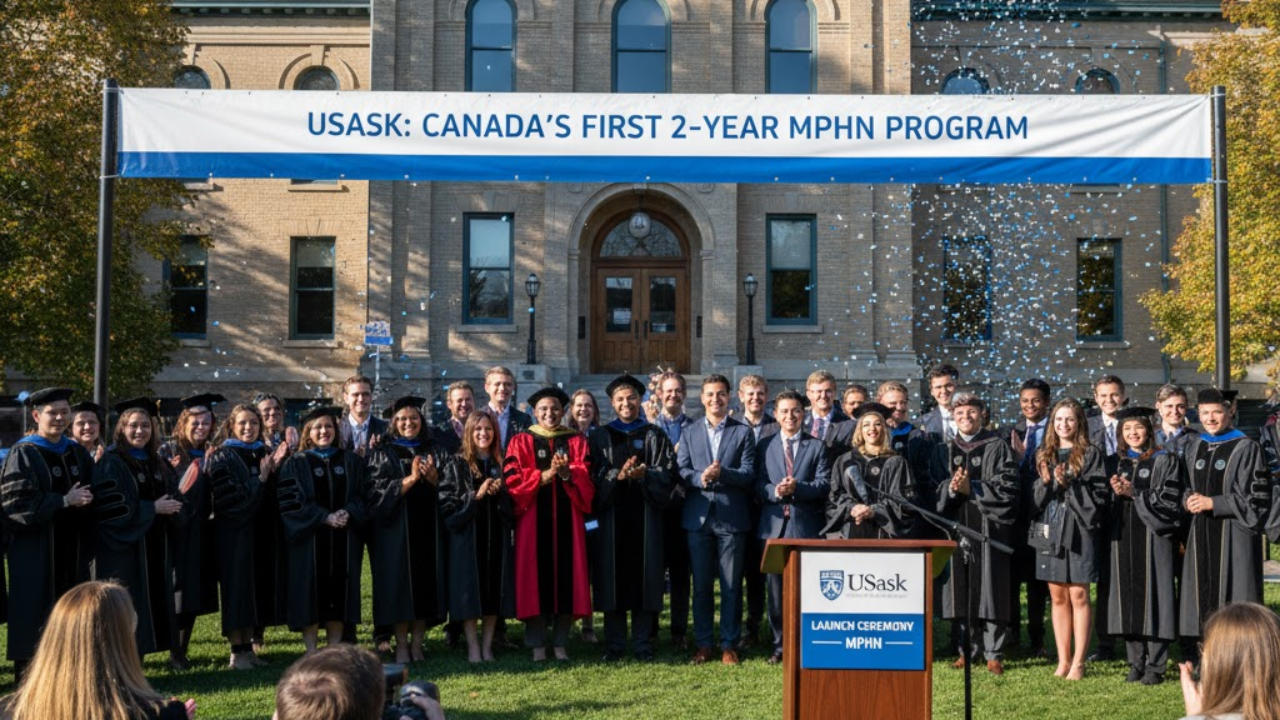
Mardaani 3 Trailer Revealed: Rani Mukerji Takes on
Rani Mukerji returns as ACP Shivani in Mardaani 3, battling a ruthless child-trafficking ring in thi

The University of Saskatchewan (USask) has unveiled a groundbreaking graduate degree: a two-year Master of Public Health Nursing (MPHN) program, the first of its kind in Canada. Designed in collaboration between USask’s College of Nursing and School of Public Health, this program aims to prepare nurses for advanced roles in community health, population health leadership, and public health practice.
Set to begin in September 2026, the MPHN is delivered online, with live seminars and flexible scheduling, allowing students from across the country — not just Saskatoon — to enroll. The program blends coursework with a research thesis component, equipping graduates with both practical and analytical competencies.
As Canada faces pressing challenges like food insecurity, homelessness, and health workforce shortages, the timing of this initiative is strategic: it positions nurses as central actors in prevention, community resilience, and health equity.
In many regions of Canada, nurses play frontline roles in community health, outbreak response, health promotion, and preventive care. However, dedicated public health nursing education at the master’s level remains rare. By launching the MPHN, USask fills a critical gap, offering a structural path for nurses to specialize in population health and systems leadership.
With rising socioeconomic inequities, mental health pressures, aging populations, and pandemic lessons, the public health domain demands stronger nursing leadership with skills in epidemiology, policy, social determinants, and program design. The MPHN is intended to respond to these imperatives by producing graduates who can lead interventions, research, and systemic reforms.
Because the program is primarily online with periodic live components, students do not need to relocate. This removes geographic barriers, especially for nurses in rural or underserved areas. It embodies a “learn where you live” philosophy that broadens access and equity in advanced education.
The program spans two years — making it more intensive than many public health master’s offerings.
Fully online, apart from scheduled live seminars or interactive sessions.
Designed to accommodate working professionals: students may balance clinical responsibilities, remote or local roles, and studies.
The first cohort begins in September 2026, and applications are open now (or as per USask’s published schedule).
Students in the MPHN program will complete:
Core public health courses (epidemiology, biostatistics, health systems, social determinants of health).
Specialized nursing population health modules (community assessment, program planning, health promotion, environmental health).
Research methods and ethics courses to support the thesis process.
A research thesis component, enabling students to engage in independent or supervised research emphasizing public health nursing topics.
This combination ensures graduates are both practitioners and informed researchers.
Graduates will be prepared to:
Lead population health assessment and community health planning.
Design, implement, and evaluate public health interventions and programs.
Integrate nursing perspectives into policy, equity, and social context frameworks.
Contribute to applied research and knowledge translation in public health settings.
Pioneer status: Being the first two-year MPHN in Canada, USask establishes thought leadership in public health nursing training.
Flexibility and access: Online delivery allows nurses from diverse regions to enroll without relocation.
Bridging practice and research: The hybrid model ensures graduates can act as both community leaders and research-informed decision makers.
Strengthening workforce capacity: As public health challenges escalate, commissioning highly trained nursing leaders enhances system resilience.
Clinical practicum or field placement logistics: Some public health components might benefit from in-person experience or placements; coordinating these remotely may be complex.
Ensuring student support: Online formats demand strong academic, technical, and peer support systems.
Balancing workload: Many prospective students may be working in clinical or public health roles; managing course load and thesis requirements demands good planning and institutional flexibility.
Retention and recruitment of faculty: Ensuring adequate faculty with expertise in public health nursing and availability for online instruction is essential.
USask’s move may catalyze other Canadian universities to adopt similar public health nursing master’s programs, leading to national scale-up in advanced nursing training. Over time, this could shift the composition of public health leadership to include more clinician-researchers deeply grounded in nursing perspectives.
Graduates trained in population health and systems thinking can lead initiatives in rural, Indigenous, remote, and underserved communities, filling gaps in preventive services, chronic disease management, and health equity efforts.
Because the MPHN includes a thesis, the program stimulates research output in nursing and public health domains. This contributes knowledge on intervention effectiveness, community health strategies, policy evaluation, and system innovation.
Nurses with public health specialization will be better equipped to work alongside epidemiologists, policy makers, social workers, and community organizations — promoting integrated, holistic approaches to health challenges.
Prospective applicants should review USask’s published eligibility criteria (e.g. nursing licensure, prior degrees, GPA thresholds) and application deadlines. The early announcement gives time for candidates to prepare transcripts, references, and research proposals.
Watch for announcements regarding orientation, technology support, academic advising, mentorship for thesis development, and mechanisms for peer interaction. These supports will be critical for student success in an online graduate program.
USask may partner with public health agencies, community health units, Indigenous health services, and governmental bodies to facilitate practicum placements, data access, or research collaboration. Stakeholders should look for such agreements being formed.
Tracking the first cohorts’ employment outcomes — whether in leadership roles, public health agencies, community nursing, policy, or further doctoral studies — will help evaluate the program’s impact.
Disclaimer
This article is based on the University of Saskatchewan’s official announcement about the launch of its Master of Public Health Nursing program as of October 2025. Program details, delivery formats, admission criteria, and timelines may evolve. Readers should consult USask’s College of Nursing or Graduate Studies for the most current and authoritative information.